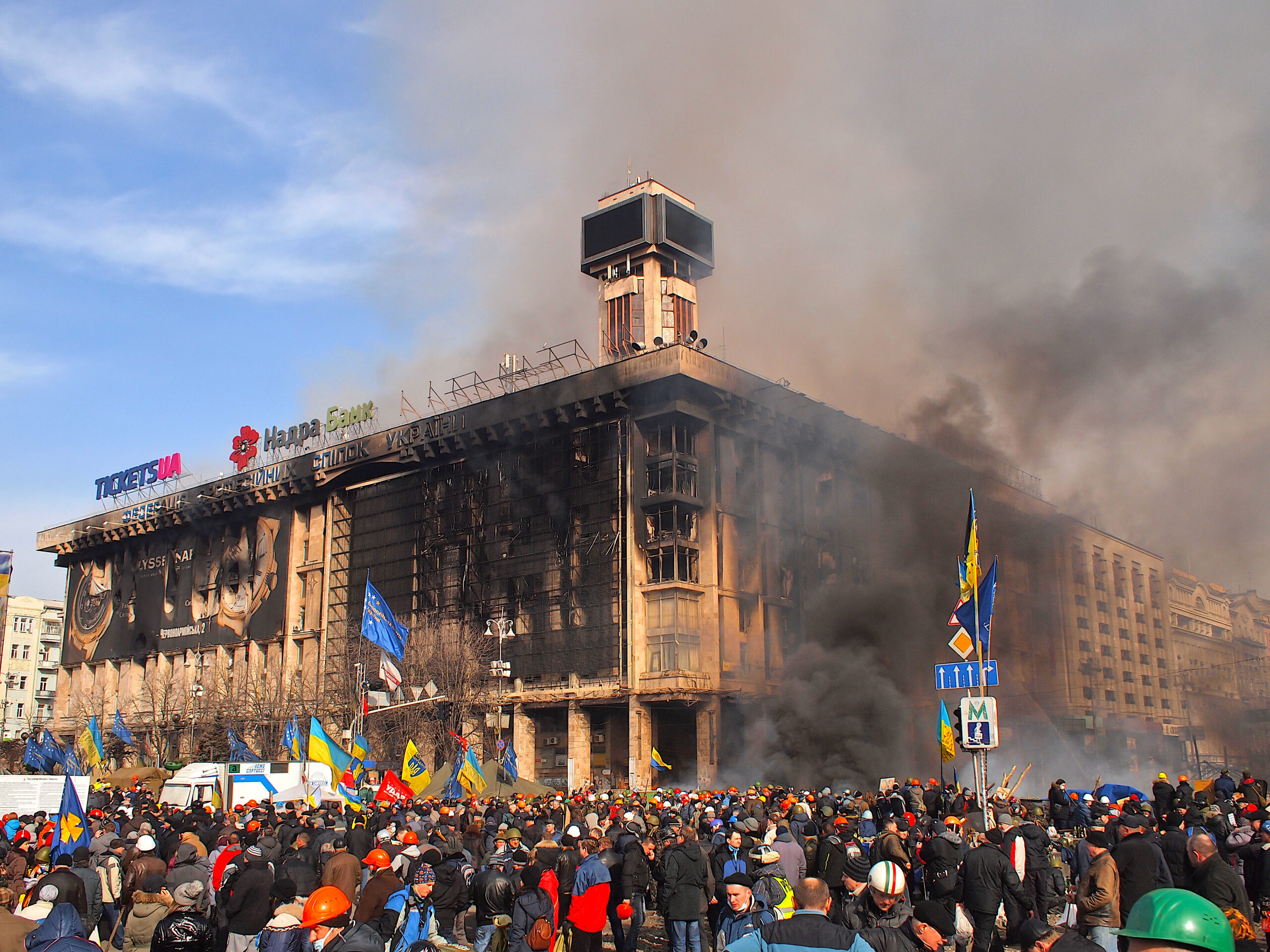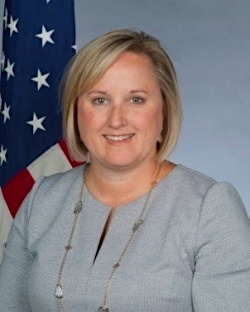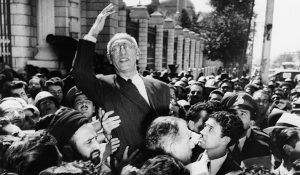There are many similarities to what is happening in Minsk today to what happened in Kiev in 2014, but there are also significant differences, writes Joe Lauria.
By Joe Lauria
Special to Consortium News
 The unrest in Belarus that is threatening President Aleksandr Lukashenko’s hold on power invites comparisons with the 2014 overthrow of President Viktor Yanukovych in Ukraine, another state bordering Russia (and Ukraine).
The unrest in Belarus that is threatening President Aleksandr Lukashenko’s hold on power invites comparisons with the 2014 overthrow of President Viktor Yanukovych in Ukraine, another state bordering Russia (and Ukraine).
In Ukraine, there is strong evidence that the United States intervened directly in a coup to oust the democratically-elected Yanukovych, whose election was certified by the OSCE. For one thing, U.S. officials appeared in the Maidan in Kiev to openly show their support for the protestors.
The then Senator John McCain addressed the crowd standing alongside Oleh Tyahnybok, the leader of the neo-fascist party Svoboda.
Victoria Nuland, then undersecretary of state for European and Eurasian Affairs also traveled at least three times to the square, handing out cakes to the demonstrators with then U.S. ambassador Geoffrey Pyatt at her side.
Nuland was captured in an intercepted telephone call with Pyatt discussing who the new Ukrainian leaders should be weeks before Yanukovych’s ouster, as they worked to “midwife” his overthrow. Nuland said that then Vice President Joe Biden would play a key role in the coup.
Biden then became Obama’s virtual viceroy in Ukraine.
As booty from this 19th Century-style takeover, the sitting vice president’s son, Hunter Biden, soon got a seat on the board of Ukraine’s biggest gas producer, Burisma Holdings. This can only be seen as a transparently neocolonial maneuver to take over a country and install one’s own people. But Biden’s son wasn’t the only one.
A family friend of then Secretary of State John Kerry also joined Burisma’s board. U.S. agricultural giant Monsanto got a Ukrainian contract soon after the overthrow. And the first, post-coup Ukrainian finance minister was an American citizen, a former State Department official, who was given Ukrainian citizenship the day before she took up the post. To top this off, Nuland said in a speech in December 2013 that the U.S. had spent $5 billion over two decades to bring “democracy” to Ukraine.
All this is the equivalent of a high profile member of the Russian Duma, the Russian ambassador to the U.S. and a Russian deputy foreign minister showing up in Zuccotti Park in lower Manhattan to support the Occupy Wall Street protests of 2011. Then a leaked phone call emerges between that minister and the ambassador discussing who should replace Barack Obama after he was overthrown. And afterward the Russian prime minister installs his son on an American oil company board, a Russian foreign ministry official becomes treasury secretary and Russia says it spent $5 billon to bring “democracy” to the United States. Would Americans suspect Russia of staging a coup?
What’s Happening in Belarus
In Belarus, the U.S. National Endowment for Democracy, which was created to undermine and overthrow governments the U.S. does not like, has 34 projects running to bring “democracy” to the country. An array of current and former U.S. officials have made ominous statements both before and after the Aug. 9 presidential election, won by Lukashenko with 80.1 percent of the vote.
On the day after the election, U.S. Secretary of State Mike Pompeo said: “As friends of Belarus, we support Belarusian independence and sovereignty, as well as the aspirations of the Belarusian people for a democratic, prosperous future.”
Biden, now poised to challenge Donald Trump for the White House in November, wrote: “My administration will never shy away from standing up for democratic principles and human rights, and we will work with our democratic allies and partners to speak with one voice in demanding these rights be respected.” The European Union agreed to impose sanctions on Belarusian officials.
Secretary of State Mike Pompeo vows to deliver 'freedom' in Belarus https://t.co/2wTJWUYbll pic.twitter.com/XIBuD7OnUh
— New York Post (@nypost) August 12, 2020
President Trump should voice strong US support for the Belarus opposition movement. The moment for freedom in Belarus is here and it will take our leadership to make it happen. Russian influence must be checked with American strength and resolve.
— John Bolton (@AmbJohnBolton) August 18, 2020
The U.S. certainly wants to pry Belarus away from the Russian orbit as it did in Ukraine to put more pressure on Moscow. There can be little doubt that the U.S. is meddling in Belarus. Pompeo showed how important Belarus is to the U.S. in February by making the first visit to the country by a U.S. secretary of state in decades.
He offered U.S. oil sales, which Belarus purchased after Russia cut the subsidies on Russian oil when Lukashenko continued to delay an agreed upon political union between the two countries. The U.S. also formalized relations with Minsk and nominated an ambassador in April.
The Differences
Despite this, there are significant differences between what happened in Ukraine in 2014 and what is happening so far in Belarus.
U.S. officials have not yet openly intervened by appearing in person with the protestors to egg them on. The nominated U.S. ambassador, Julie Fisher, faced confirmation hearings only two weeks ago and said: “What we are trying to get done is basically to ensure that there is space, to ensure there is space for more than one voice in this country.”
Lacking a leaked telephone call it is difficult to know what the U.S. may be up to covertly.
Unlike in Ukraine, there are no influential neofascist groups in Belarus.
Another difference is that Lukashenko is not Yanukovych. The latter won the presidency in 2010 in an election declared free and fair by the Organization for Security and Cooperation in Europe (OSCE). “The process was transparent and offered voters a genuine choice between candidates representing diverse political views,” the OSCE reported.
Lukashenko is in power for 26 years, having won elections since 1994 by around 80 percent, with international election observers voicing strong concern.
It is important to point this out. One can acknowledge U.S. meddling and regime change efforts as well as the undemocratic nature of the targeted leader at the same time. They do not negate each other. In other words even the worst leader does not justify the U.S. or anyone else interfering in the internal affairs of a sovereign state (a pillar of the UN Charter).
Lukashenko’s blatant authoritarianism has created a varied and legitimate protest movement that a carpetbagging U.S. is likely trying to manage towards its own ends, such as bringing Belarus into the neoliberal West, if not into NATO one day, whether Belarusians want that or not.
Russia, which has not had the best relationship with Lukashenko, is clear about the West butting out.
2/2 resolve the problems of their country without any foreign interference and meddling. We also highlighted double standards of our Western colleagues who don’t bring to the Council similar post-election issues and cases of police brutality in their states and other countries
— Dmitry Polyanskiy (@Dpol_un) August 18, 2020
Some Protestors Share the Blame Too
Belarus protesters chanting the name of the CIA’s most successful propaganda network of the Cold War. This is just sad. https://t.co/yT9AFquzXd
— Mark Ames (@MarkAmesExiled) August 16, 2020
By chanting pro-Western slogans, some protestors are tainting their demands by associating themselves with the U.S. and handing Lukashenko a reason to crush them. Lukashenko’s authoritarianism is also handing the U.S. an excuse to interfere, claiming it is bringing democracy to Belarus, though democracy has never really mattered much to Washington.
Post-war America has overthrown more democratically-elected leaders than dictators. That in itself puts the lie to “spreading democracy.” The first CIA coup in Syria in 1949 overthrew an elected leader for a military government. Four years later in Iran the U.S. carried out a reversal of 1776–overthrowing a democratically chosen prime minister, Mohammad Mossadegh, to install a king back to the throne.
(A new document released in time for Wednesday’s 67th anniversary of the Iran coup, shows that Britain led the operation. The Truman administration refused to join it, believing that Mossadegh would not allow communists to takeover, as Britain was arguing. Only after the election of Dwight Eisenhower and his appointment of Allen Dulles as CIA director in February 1953 did the U.S. take part in the coup six months later.)
The following year the U.S. toppled the reformer Jacobo Arbenz in Guatemala to put in place a military junta, just as the CIA did in Chile in 1973, ousting the democratically elected socialist Salvador Allende to put in place the fascist Augusto Pinochet.
Everybody Plays the Game
Though it will probably never change, I don’t entirely agree with what former British diplomat Craig Murray wrote in an article republished today on Consortium News. He draws the line on foreign meddling at assassination and coup d’état, but accepts the game diplomats play interfering in the domestic politics of the nation to which they have been sent.
He admits to having done so himself.
A higher standard should be called for. Whatever happens in Belarus should be entirely up to the Belarusian people. A people cannot be independent any other way.
Joe Lauria is editor-in-chief of Consortium News and a former UN correspondent for The Wall Street Journal, Boston Globe, and numerous other newspapers. He was an investigative reporter for the Sunday Times of London and began his professional career as a stringer for The New York Times. He can be reached at joelauria@consortiumnews.com and followed on Twitter @unjoe .
Please Contribute to Consortium News
on its 25th Anniversary
Donate securely with  PayPal here.
PayPal here.
Or securely by credit card or check by clicking the red button:





Just an excellent piece, Joe Lauria.
I agree with you about Craig Murray’s piece on the subject. It is the first time i have ever been seriously disappointed in that writer. He says a couple of things I take exception to.
As for Lukashenko’s authoritarianism, well, America has no problem with the governments of Saudi Arabia, Egypt, Bahrain, and others just as it had no problem with Ceausescu of Romania or the junta in Argentina or the Shah of Iran or Pinochet of Chile or Park of South Korea or many, many others – bloody tyrants all.
Indeed, there is every reason to say Lukashenko is less of a tyrant than “democrat” Netanyahu, who has killed many thousands of Palestinians, wounded tens of thousands, holds seven thousand in prison with no trials, and steals other people’s property regularly. Of course, he holds an entire people against their will with no rights.
What the US looks for are not principles and ethics or democracy or human rights, but compliance with its own selfish policy.
There are no principles in American foreign policy.
And whats more tyrannical than about 4% of the world’s people telling the other 96% how to run their affairs under threat of force/
That is the nature of the American Empire being served by a $1,000,,000,000,000 a year military/security agency complex.
I understand that for the sake of brevity you omitted a few juicy facts about Netanyahu, the paragon of a type of leader that America would support. First, he is a kleptocrat, would he fail to get a deal giving him Prime Ministership, he would bet a trial for bribery. This seems to an absolute requirement to be the member of the club (leaders that America would support). Second, he sustains his popularity with racist slogans, warmongering. little wag-the-dog mini-wars. Finally, he delivers proofs of obeisance he gets in USA (voters may worry if an alternative leader would be as effective in getting both American parties to enthusiastically follow anything he says).
Now we enters a love affair with the emirs of the Gulf who likewise need proofs of bipartisan support to bolster their shaky thrones. Emirates being feudal, the notion of corruption does not seem to be in the vocabulary, but they need foreign support even more than Israel.
Then there is a leaders of countries where the government changed with the assistance of USA, Haiti, Honduras, Ecuador, Brazil and Bolivia. One more charming than another.
The list of odious regimes in Africa that enjoy American support is long, but I lack expertise to compile it. I would mention Angola, where communist MPLA got to power after independence, being bitterly opposed by USA. But their mended their ways, put Chevron corporation in charge of oil, and presidential family in charge of spending the proceeds for personal benefits. Angola combines large oil revenue per citizen with abysmal “human development indicators”, even when compared with other African countries. Nigeria looks like well-run country in comparison. Not a word of critique in the West.
Thank you Joe for this overview – and nowhere more so than your last few sentences. “A higher standard (for diplomats and other foreign govt voices, e.g. BBC World Service/VOA/NED) should be called for. Whatever happens in Belarus should be entirely up to the Belarusian people. A people cannot be independent any other way.”
It is absolutely not the right of any other power, country or government to interfere in the government, culture, society, social structure of another. No matter how much we in the west arrogate such “right” to ourselves, ignoring our pasts, whitewashing our present actions – usually by obfuscation and by repeatedly pointing out the faults (as *we* perceive them or determine them) in the targeted people, government…
As I’ve written before – We in the west need to inspect our own pasts histories and correct the multiple wrongs we have done; we need to put right our own houses. We ignore our own beams (logs) while screaming about the specks (motes) of others…
For those who want to see more hard evidence of the 2014 American coup in Ukraine, watch this short video.
hXXps://www.youtube.com/watch?v=nW7lNABfDVk